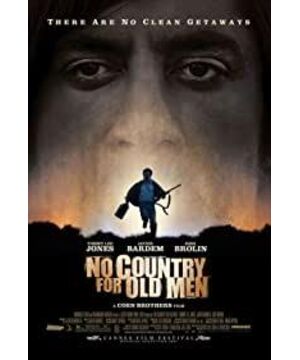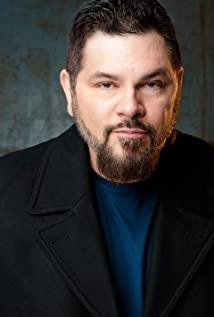The story is deliberately arranged in Baltimore, a town in the western United States, where the environment is far from the developed urban society, so that many scientific symbols such as computers and mobile phones that symbolize modern progress disappear before our eyes invisibly. The narrative language The environment is consciously positioned in a relatively backward and primitive environment, which seems to imply that the people here should not have the shrewdness of the urban crowd, and face life with a simple and unpretentious temperament. The pace here is slow, even with some dullness, but the people who have lived here for a long time are not dissatisfied with it. The plain and gentle life makes them feel at ease with the status quo, so they are caught off guard by this sudden change.
The typical rural accent dialogue between the characters seems to be an ideographic symbol of isolation. Life here is very different from modern life, even if the communication tool—language—is different. They have their own breathing patterns and behavioral logic, but the sudden bloody murder was beyond their expectations. For them, it is not only a criminal case that is difficult to investigate, but also a malicious aggression of new thinking. It wreaks havoc like a new virus. In the face of such rampant raging, people are just helpless and helpless except for fear and surprise. At the end of the film, no culprit was arrested, which is obviously contrary to the traditional argument that justice triumphs over evil. Because the culprit is no longer an allegation of evil forces, but a representative of the logic of dealing with affairs in a new society. His escape conveys a thought: the old thinking is outdated, and all words and deeds need another rule to regulate and replace. As the title of the film says: no country for an old man. The old people who clung to the past cannot control the new rhythm of the town again. In fact, the change has already begun, but we found it too late. When they really realize that everything around them has changed beyond recognition, they are unable to adapt to such changes. Only a long groan of sighs, a lonely person silently monologues in a sympathetic tone, feeling the loneliness and helplessness after the vicissitudes of his life.
This kind of monologue was displayed eye-catchingly at the beginning of the film. The ambiguous country accent reveals the sentimental low mood of the protagonist Sheriff Bell. Together with the desolate town scenery and the evening sunset, it seems to create a deep sadness. Feelings, the slow pace of the monologue tells his helplessness: the dead are like this, never return, I can do nothing!
Bell is the sheriff, from young to old. Such role positioning expresses his due control power, which is the governance and security protection of the entire town. He is a typical representative of Baltimore people, and the real referent symbolizes the kind of old people in the old age. He managed this area for a lifetime and understood it for a lifetime. He thought that everything was under control. Facing the case, he shouldn't have to be anxious, just face it calmly. However, things did not develop as he wanted, but gradually moved away from his control. He was unable to catch the criminals in time, was always behind, and even powerless, so that in the end he witnessed the innocent people being killed one by one, and the evildoers again. Fleeing, only sighs again and again for myself.
The language of the film is always deliberately narrated in a gentle manner, so that the terrifying slowness creates a terrifying atmosphere. The killer was cruel and terrifying, even if he showed a smile, he looked terrifying, always revealing his murderous aura, making every town dweller who talked to him involuntarily fearful. The killer seems to be a representative of the new power in the film. He became a missionary who instilled new thinking. He taught every inhabitant of the town with his own bloody methods and words that were different from the traditional. , Wei Wei Nuo Nuo. Faced with such a change, they were so scared that they were overwhelmed.
The cold lines are an element that cannot be ignored in the whole movie, and the core idea of the story is expressed in it. The opening monologue of the sheriff, the conversation between the killer and the old grocery store owner, etc. all conveyed the vicissitudes of the city after the people were wrong, and the significant changes in the logic of behavior.
The key element of the new life logic has been emphasized more than once-Money. The fuse of the case was the temptation of 20 million US dollars; the conversation between the killer and the grocery store owner, after the former's reprimand and instruction, finally took out coins to determine the fate of his destiny; when Moss was forced to flee, scarred and exhausted Still unwilling to give up the 20 million in the heat; when Moss was chased and killed and there was nowhere to escape, it was Money that allowed him to obtain a T-shirt and beer in the hands of young people; when the killer tried to escape after a traffic accident , It is also the result of relying on Money to obtain new shirts and confidentiality. The language of dealing with things in towns has been completely replaced by money, and people are no longer "lasting friendship" as they used to be, but rather naked "money" dialogues. Such abrupt changes left the battle-tested sheriff Bell at a loss. He couldn't control everything around him as before, and his emotions were fragile here.
At the end of the story, the killer is still at large, Moss can't escape the doom of death, and Bell can't help but get lost in the desolate land. Longing for answers to such changes in his life, he had a sentimental dialogue with his wife who was in the same room, but the dialogue was nothing more than his own confession. He wanted to confide in his old pain thoroughly.
In the end, he came to the answer with a very compassionate attitude: the world really no longer belongs to us, facing the vicissitudes of time, I really can't do anything!
View more about No Country for Old Men reviews











